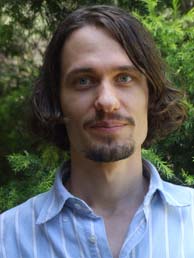Augustus William Hare wrote that “Poetry is to philosophy what the Sabbath is to the rest of the week.” While Mr Hare runs the risk of creating an artificial divide between poetry and philosophy (to the potential detriment of both), there is something powerfully restorative about a poem.
This year CPX is marking World Poetry Day by taking a Sabbath from prose and argumentation and instead reveling in the richness of the Christian poetic canon. We asked CPX staff and friends to share their favourite poems of a spiritual bent. For poetry-lovers, we trust you find much here to enjoy. For the poetry-shy, we hope that you find many new friends among these poetic greats.
|
Simon Smart
|
Suspended I once heard someone describe Christian ‘Joy’ as “a defiant nevertheless”—profound hope in the face of life’s all too real and present tragedies, disappointments and sorrows. This poem by Denise Levertov seems to connect with something along those lines and I find it very moving. Many believers describe the Christian journey as experiencing the ‘absence’ of God as much as his presence. And yet, the same people often attest to a deep sense that, even in their darkest moments, God has not let them go. I had grasped God's garment in the void |
|
John Dickson
|
Holy Sonnets, no.14 I have a soft spot for paradoxes, and in John Donne’s Holy Sonnets he takes these to wonderful heights. In the form of a kind of love song, with erotic overtones, he describes what it is to know God, rather than merely to know about God. In surrendering to absolute power, we find our victory as human beings; in allowing ourselves to be crushed we are made whole; in being ravished by God, he says, we become truly pure. Batter my heart, three-person'd God; for you
Christ of the Never In Henry Lawson’s Christ of the Never this reputed agnostic and drunk simultaneously offers a stinging rebuke of the church of his day and a song of praise to the ideal of Jesus. The poem describes the work of Peter McLaughlin, an historical bush preacher of questionable pedigree who wandered the ‘Never Never’ country in the 1800s serving the roughest settlers in the country. For Lawson, McLaughlin is a Christ-figure who puts formal religion to shame. The closing lines are chilling in their criticism and insight: “I place him in front of all churchmen; Who feel not, who know not – but preach.” With eyes that seem shrunken to pierce For the cause that will ne'er be relinquished He works where the hearts of all nations By his work in the hells of the shearers, Dew With more than 20,000 Haiku poems to his credit, Kobayashi Issa is one of Japan’s best-loved literary masters and a devout Buddhist. He lost his mother at a young age, was cruelly treated by his step-mother and lost four of his children and his wife during childbirth. He remained ever-faithful to the Buddha’s Third Noble Truth that the “cessation of suffering comes through the relinquishing of desire”. All hardship is ‘dew’ he believed, an aspiration soon forgotten when one is able to detach from one’s passions. At the death of one of his girls, he penned words revealing the tension he felt between his desire to be a faithful Buddhist and his attachment to his loved ones. Tsuyu no yo wa This world of dew |
|
Justine Toh
|
Hurrahing in Harvest Gerard Manley Hopkins’ ecstatic passion for God and his creation is nowhere on better display than in Hurrahing in Harvest. Hopkins’ irrepressible energy and addictive alliteration makes Hurrahing a lip-smacking pleasure to read aloud, though it’s hard not to froth at the mouth when it comes to the climax—after which I feel dazed, charged, winded and yet all wound up.
Summer ends now; now, barbarous in beauty, the stooks arise I walk, I lift up, I lift up heart, eyes, And the azurous hung hills are his world-wielding shoulder
Pied Beauty We live in an age of endless diversity that celebrates “all things counter, original, spare, strange”. While Christianity has often been criticized for imposing uniformity and diminishing difference, Hopkins suggests that the teeming variety of life in all its assorted and irregular forms begs to differ. And so he celebrates all that is “fickle” and “freckled” of God’s creation, proclaiming “glory be to God for dappled things”. Glory be to God for dappled things— All things counter, original, spare, strange; |
|
Greg Clarke Chief Executive of The Bible Society
|
Bat's Ultrasound Les Murray From one of the world's great poets came a most extraordinary collection of Australian poetry which seeks to imagine the God-created world through the eyes, ears and vocal chords of animals. This one explores the world of the bat, and it is worth hearing Murray (an incredible linguist) read it himself at this website: http://lesmurray.org/pm_bu.htm Sleeping-bagged in a duplex wing
Few are vampires. None flit through the mirror.
ah, eyrie-ire; aero hour, eh?
A rare ear, our aery Yahweh. Seven Stanzas at Easter Updike is a confrontingly honest novelist, and brings the same frankness to bear on the Easter story here. Make no mistake: if He rose at all
It was not as the flowers,
The same hinged thumbs and toes,
Let us not mock God with metaphor,
The stone is rolled back, not papier-mâché,
And if we will have an angel at the tomb,
Let us not seek to make it less monstrous,
Dream of the Rood One of the first Christian poems, in Old English (which I abandoned after first year at uni!). A wonderful imagining of what it was like to be the cross on which Christ hung. This version has been translated into modern English for reading ease. Listen! The choicest of visions I wish to tell,
Read more at http://www.english.ox.ac.uk/oecoursepack/rood/index.html |
|
Kate Wilcox
|
A Mistake Czeslaw Milosz Czeslaw Milosz (which I’m reliably informed is pronounced Chez-wah-ff Mee-woe-sh) is a Catholic, Polish poet whose life spanned most of the twentieth century. Milosz spent World War II living in Warsaw under Nazi occupation, and much of his poetry is shaped by these early experiences of horror. His poetic output is considerable, and many of them deserve a mention, but A Mistake is a personal favourite. It is a beautiful reflection on the meaning of life, in light of the certainty of death. I thought: all this is only preparation But a paraplegic in my street It is true. We have a beautiful time
A General Song of Praise to Almighty God Owing to the Christian practice of singing praises, much spiritual poetry over the ages, from today back to the Psalms, was written to be sung. This hymn from the seventeenth century is wonderful in its energy and boisterousness – I feel like trumpets should accompany each reading. The poet is, at the same time, confident in his praise of God and taken with God's incomprehensibility. The wonderful final lines express the poet’s joy (and perhaps slight artistic frustration) at the way God’s person and nature escape metaphorical comparison: “Thou art a sea without a shore/ A sun without a sphere / Thy time is now and evermore / Thy place is everywhere.” How shall I sing that Majesty Thy brightness unto them appears, How great a being, Lord, is thine,
Casimir Pulaski Day It seems a little strange to mention contemporary, indie singer Sufjan Stevens alongside Donne, Eliot, Milton and co, but his music shows one way that spiritual poetry lives on in modern mainstream culture. Casimir Pulaski Day tells the story of a young man whose girlfriend is diagnosed with cancer in the first stanza and dies from it by the conclusion of the song. It speaks of the experience of suffering, and the distinct flavor this experience has for Christians. How devastatingly familiar to anyone who has been in church for any length of time are the lines: “Tuesday night at the Bible study / We lift our hands and pray over your body / But nothing ever happens.” Stevens reframes Job’s famous words (“The LORD gives and the LORD takes away”) in his final poignant stanza: “All the glory when He took our place / But He took my shoulders and He shook my face / And He takes and He takes and He takes.” Goldenrod and the 4H stone In the morning, through the window shade Tuesday night at the Bible study In the morning when you finally go All the glory that the Lord has made |
|
Ben Myers Author and lecturer of systematic theology at Charles Sturt University's School of Theology
|
Paradise Lost After all his political hopes and ambitions had been shattered, Milton made sense of this painful, disillusioning experience by creating a great tragic epic poem about Adam and Eve, their creation, fall, and redemption. Milton discovered that the Christian doctrine of original sin isn't just a theory or a gloomy idea: it is a powerful and compelling explanation of the real texture of our experience, in all its misery, grandeur, and fragility. The poem itself goes for hundreds of pages, but we get a sense of the loss that occurred at the Fall in the following lines: …her rash hand in evil hour
Love III I think Herbert's “Love III” is one of the most perfect and exquisite poems ever written about the Christian experience of sin and redemption. If you want to know what it feels like to be a Christian, read Herbert. In simple, homely, monosyllabic language, the poem portrays a dialogue – or really an argument – between the welcoming Christ and his unworthy guest. When the Jewish philosopher Simone Weil read this poem, she said: “Christ himself came down and took hold of me.” Love bade me welcome, yet my soul drew back, “A guest,” I answer'd, “worthy to be here”; “Truth, Lord, but I have marr'd them; let my shame
Ash Wednesday Before his conversion Eliot's poetry gave scathing depictions of the emptiness and barrenness of life. His Christian poetry never softened this bleak assessment. For Eliot, the Christian faith doesn't provide easy consolation or a nice optimistic outlook. In the incarnation, Christ enters into all the barrenness of our experience, into the sad fragility of time, and silently, secretly redeems us from within. Christ doesn't create another perfect world, but redeems this world and this time. There is a lot of false Christian optimism these days, and Eliot's poetry is a powerful antidote. Because I know that time is always time Read more at http://www.msgr.ca/msgr-7/ash_wednesday_t_s_eliot.htm |
|
Peter Alexander
|
Four Quartets T.S. Eliot Eliot, one of the greatest Modernist poets, became a Christian in 1927, and from then on produced a stream of deeply thoughtful (indeed, often tormented) works which dig back into the Christian traditions of the West to find a way to make sense of Twentieth century chaos. What’s so striking about Eliot is that as one of the greatest of Modernist poets in English you’d expect his writing to be unraveling Christian culture. But, in fact, you would not be able to understand what he’s writing about if you couldn’t identify the Christian background of this great twentieth century poem. In this section of his magnificent series of linked poems, Four Quartets, you find yourself unmistakeably in a Christian linguistic context, of a Roman Catholic Latin prayer to the Virgin Mary: Lady, whose shrine stands on the promontory, Repeat a prayer also on behalf of
Also pray for those who were in ships, and
Widower in the Country Les Murray is one of the two or three finest poets writing in English today, and, incidentally, is Australian. Murray’s poetry, while it never preaches, is imbued with the influence of passionately held Christian convictions, which can be seen everywhere in his verse, though seldom overtly. This poem, ‘Widower in the Country’, tells the experience of a man whose wife is recently deceased, experiencing Christmas without her. This is a poem about a world like Beckett’s dead world in Endgame: the Widower has lost his wife, and his world has fallen to pieces. The emptiness of his Christmas shows his loss of faith as well. I'll get up soon, and leave my bed unmade. This afternoon, I'll stand out on the hill Coming on dark, I'll go home, light the lamp |
|
Tony Golsby-Smith |
The Brain — is wider than the Sky I love this little poem because it inverts our sense of what is large and what is real. Against the vast panorama of matter and the material universe, we humans can feel small and insignificant. And if we calibrate significance according to size, then of course we are outdone. But Dickinson turns the tables on matter, by introducing a different parameter to the comparison – the Mind and the Imagination. This new parameter restores primacy to humans, because we all know that our Imaginations can in a very real way ‘contain’ the vastness of the Sky but conversely the Sky can never ‘contain’ us by an act of Imagination because it is inanimate. Her logic is surgical, just like her poetry. The first two stanzas lay out the empirical evidence by appealing to our common experience. The last stanza resolves the paradox she has set up in the only way possible; our Imagination is participating in the ‘weight of God’. So the Brain is more substantial than matter because it shares the ‘weight’ of God.
The Brain — is wider than the Sky The Brain is deeper than the Sea The Brain is just the weight of God
|



.jpg)






